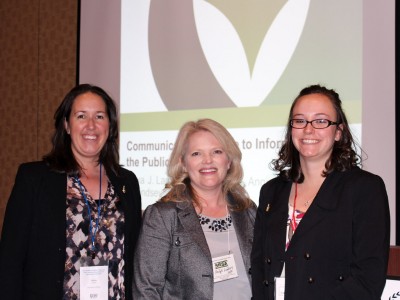 By Laura Gorham
By Laura Gorham
PIE Center researchers took on Dallas to present research in three different sections during the 2014 annual meeting of the Southern Association of Agricultural Scientists.
Nine faculty, staff and graduate students presented research findings in the agricultural communication, agricultural education and rural sociology sections. SAAS provides an opportunity for university researchers from states to share research findings, exchange knowledge and promote the agricultural industry.
The agricultural communications section kicked off with Ph.D. student Arthur Leal presenting research based on the last year’s public opinion survey about water quality and quantity.
Assistant Professor Joy Rumble, a PIE Center faculty researcher, was recognized for having the most outstanding research paper and presentation in the agricultural communication section. Rumble presented her dissertation research on the effect transparency about agriculture has on attitudes.
Angie Lindsey, a PIE Center post-doctoral associate, shared her work on the Healthy Gulf, Health Communities grant and presented a paper in the rural sociology section based on the industry-based initiative to ensure a resilient seafood industry.
Assistant Professor Alexa Lamm, also the associate director of the PIE Center, discussed the impact of school-based gardening programs in underprivileged areas in her presentation.
Doctoral student Keegan Gay also presented research about effectively branding local food in the rural sociology section. He said the conference gave him the opportunity to find out more about the agricultural communications field.
“SAAS provided a valuable opportunity to see other research going on,” Gay said. “It made me become much more familiar with the research going on in my field of study.”
Jessica Holt presented the last day of the conference in the agricultural education section. Holt, a Ph.D. candidate, presented research on agriculture’s role in school lunch programs.
Two graduate students also participated in the poster session. Gay and master’s student Caroline Roper presented two posters on how PIE Center research seeks to understand how consumers define local food.
Although researchers focused on presenting research throughout the conference, Lamm, Rumble and Lindsey conducted a breakout section on communicating science. Faculty members elaborated on how the PIE Center translates issue-based research into communication tools and training opportunities that relay information to stakeholders.
“The session allowed us to showcase what we do every day here at the PIE Center,” Lamm said. “We wanted to share our success with others in hopes of inspiring them to think about how to most effectively share their research.”

















